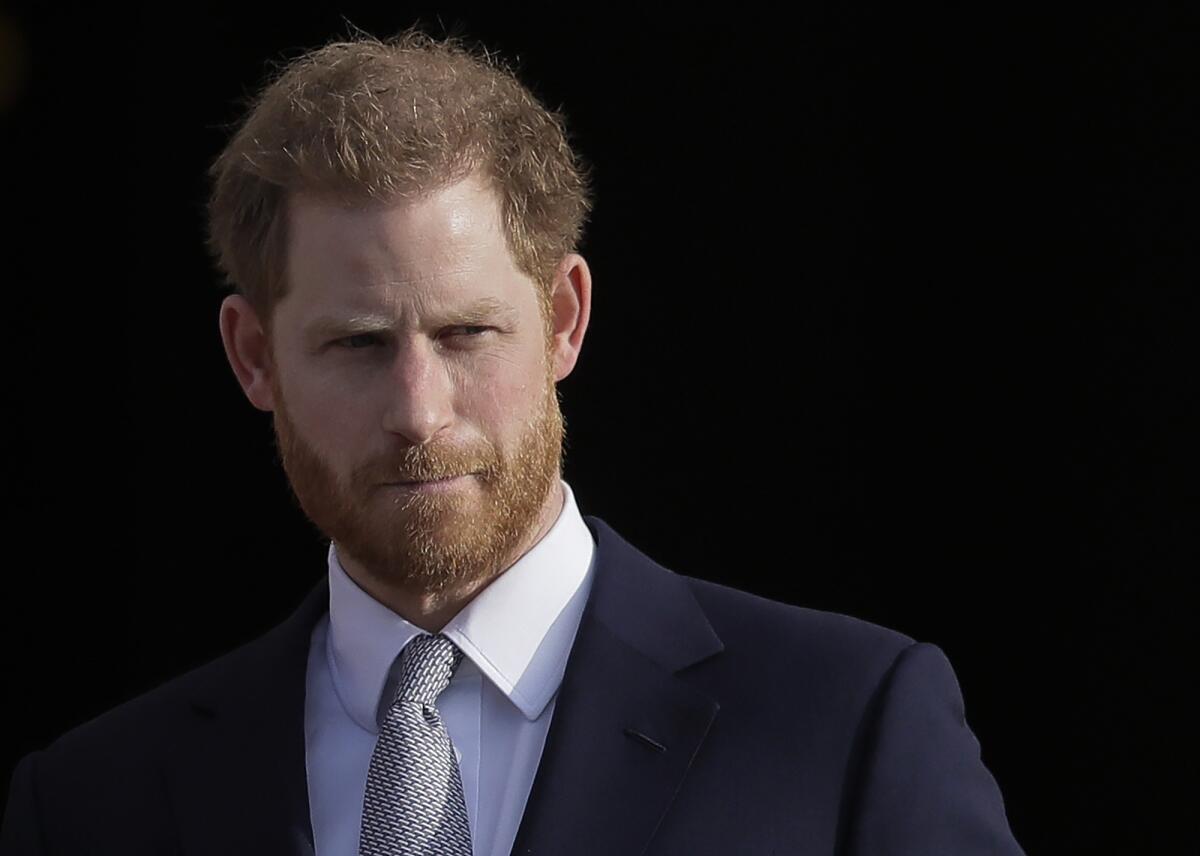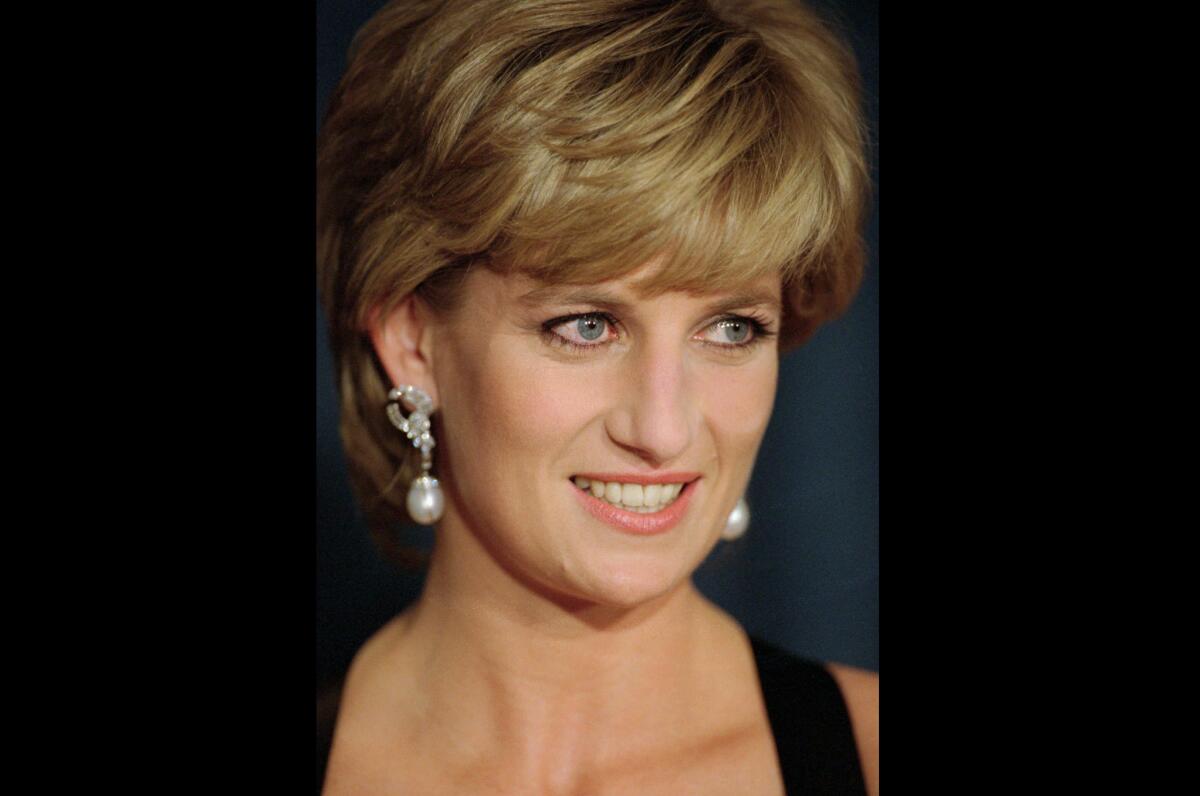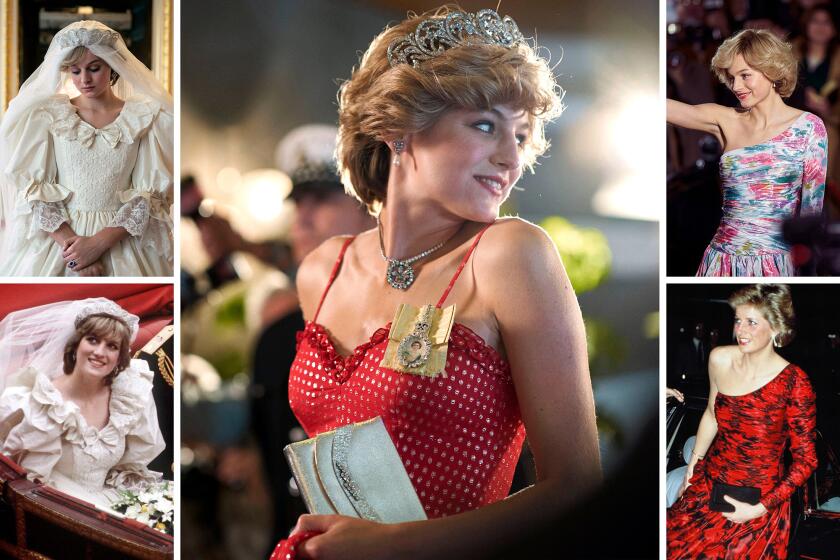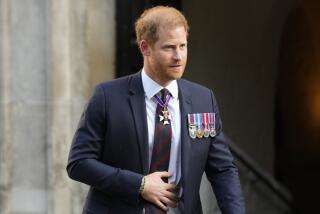Prince Harry opens up about trauma of Diana’s death, ‘a nightmare time in my life’

- Share via
“Unfortunately, when I think about my mom, the first thing that comes to mind is always the same one over and over again,” Prince Harry, the Duke of Sussex, says of the late Princess Diana in a new docuseries, premiering Friday on Apple TV+. “Strapped in the car, seatbelt across, with my brother in the car as well, and my mother driving, being chased by three, four, five mopeds with paparazzi on. And then she was almost unable to drive because of the tears.”
“The Me You Can’t See,” which Prince Harry co-created with Oprah Winfrey to destigmatize the discussion of mental health by encouraging others to share their stories, offers a rare glimpse into the prince’s inner life.
Among the other celebrities who open up in the docuseries are singer Lady Gaga, San Antonio Spurs forward DeMar DeRozan and Robin Williams’ son Zak Williams.
In the series, Harry, the son of Prince Charles and Diana, who died in a Paris car crash in 1997 while being chased by photographers, says he has been going to therapy for more than four years. When asked by Winfrey why he decided to take those steps, the Duke of Sussex said he wanted to heal from the past.
Costume designer Amy Roberts explains how Netflix’s drama re-created Diana’s most memorable looks — and how her evolving fashions tell the story of Season 4.
“I was so angry with what happened to [Princess Diana] and the fact that there was no justice. At all. Nothing came from that. The same people that chased her into the tunnel photographed her dying on the backseat of that car,” Prince Harry says.
“I didn’t want to think about her, because if I think about her, then it’s gonna bring up the fact that I can’t bring her back, and it’s just gonna make me sad,” he continued. “What’s the point in thinking about something sad? What’s the point in thinking about someone that you’ve lost and you’re never gonna get back again? And I just decided not to talk about it.”
Twelve years old at the time of his mother’s death, Harry remembers feeling helpless as he watched the paparazzi and the media harass Diana.
“The Me You Can’t See” premieres fast on the heels of an announcement by the BBC on Thursday that an internal investigation found journalist Martin Bashir used dishonest tactics to persuade Diana into doing the bombshell 1995 interview where she opened up about her rocky relationship with Prince Charles.
“The ripple effect of a culture of exploitation and unethical practices ultimately took her life,” Prince Harry said in a statement addressing the investigation. “To those who have taken some form of accountability, thank you for owning it. That is the first step towards justice and truth. Yet what deeply concerns me is that practices like these — and even worse — are still widespread today. Then, and now, it’s bigger than one outlet, one network, or one publication.”

Diana’s sudden death left Harry shocked and unable to process the grief; what he remembers the most from his mother’s globally televised funeral, he says in the docuseries, were the “sounds of hooves going along the pavement.”
“It was like I was outside of my body and just walking along, doing what was expected of me, showing one-tenth of the emotion that everybody else was showing,” the Duke of Sussex says. “I thought, ‘This is my mum. You never even met her.’”
The royal family didn’t discuss Princess Diana’s death either, leading Harry to suppress his emotions about the tragic incident. What he couldn’t bottle up were his feelings about cameras.
“And so 28 to probably 32 was a nightmare time in my life. I’m freaking out every single time I jump in the car and every single time I see a camera,” the prince says. “I would feel as though my body temperature was 2 or 3 degrees warmer than everybody else in the room. I would convince myself that my face was bright red, and therefore, everybody could see how I was feeling, but no one would know why, so it was embarrassing.”
Help is available
If you or someone you know is feeling suicidal, call the National Suicide Prevention Lifeline at 800-273-8255.
Prince Harry, who had taken to drinking to mask his pain, describes himself as a burned-out “yes man.” It wasn’t until he met his wife, Meghan Markle, the Duchess of Sussex, that he took lasting steps to address his mental health problems: The prince made the decision to commit to therapy after an argument with Meghan, when she told him he needed to see someone.
Harry’s comments about his and Meghan’s relationship, and her racist mistreatment by the British press, elaborate on the couple’s blockbuster interview with Winfrey in March, in which they said the palace had raised “concerns” about the skin color of their then-unborn first child and discussed Meghan’s experience with suicidal thoughts when she was six months pregnant.
Column: Oprah’s interview with Harry and Meghan was damn good TV. What worked and what didn’t
CBS’ special with the Sussexes was the highest-rated gender reveal party ever (it’s a girl!) and a reminder that Winfrey remains the interview queen.
“We would get followed, photographed, chased, harassed,” Prince Harry says in the new interview. “It takes me back to what happened to my mom and what I experienced when I was a kid. But it went to a whole new depth with not just traditional media but also social media platforms as well. I felt completely helpless.”
He says one of the major influences on his and Meghan’s decision to step away from royal duties was “feeling trapped and feeling controlled through fear, both by the media and by the system itself, which never encouraged the talking about this kind of trauma. ... Now, I will never be bullied into silence.”
“We chose to put our mental health first,” he explains, noting that his father, Prince Charles, would tell Harry and his brother, Prince William, that hardship was part of the royals’ job. “That’s what we’re doing and that’s what we will continue to do. Isn’t this all about breaking the cycle? Isn’t this all about making sure that history doesn’t repeat itself? That whatever pain and suffering has happened to you, that you don’t pass [it] on?”
More to Read
The complete guide to home viewing
Get Screen Gab for everything about the TV shows and streaming movies everyone’s talking about.
You may occasionally receive promotional content from the Los Angeles Times.








